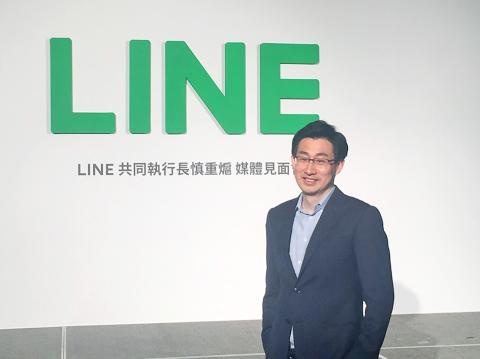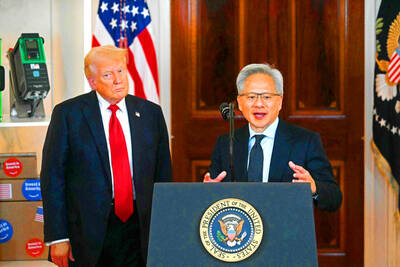Over next three years, Line Corp plans to invest NT$3 billion (US$97.02 million) in Taiwan, as it aims to expand into areas such as financial technology, e-commerce and digital content, co-CEO Jungho Shin told a news conference in Taipei yesterday.
It would be another significant investment in Taiwan for the Tokyo-based firm after its subsidiary, Line Financial Corp, invested NT$4.82 billion in Line Financial Taiwan Corp (台灣連線金融科技) in March in a bid to launch the Web-only Line Bank in Taiwan.
Line Financial Taiwan holds a 49.9 percent stake in Line Bank, which would cost the firm NT$4.99 billion if the Financial Supervisory Commission (FSC) grants it the license later this year.

Photo: Liao Chien-ying, Taipei Times
“The Taiwanese market is a great investment environment, as people embrace new technologies and there are many talented people who can help us develop digital innovations,” Shin said.
The firm plans to introduce new services in Taiwan over the next three years and would expand them into other markets if they prove successful, he said.
Line Corp does not have the largest user base in Taiwan, but Taiwanese consumers understand the company’s messaging and other services best, which made Line Corp think it would be a good idea to test its other services in the nation, Shin said.
“I am often surprised at Taiwanese users who have always been willing to give feedback on our new services,” he said.
The firm’s electronic payment service, Line Pay, has achieved huge success in Taiwan, with the number of users totaling 6.04 million and the number of shops using the tool surpassing 120,000 as of Wednesday last week, Shin said.
“The way Line Pay has been promoted here has become a model for our marketing teams in other countries,” Shin said.
Line Taiwan Ltd (台灣連線) would spend the NT$3 billion investing in business partners, expanding its businesses and recruiting more employees, Shin said.
Line, which started as a communication software provider, but gradually expanded into e-commerce and mobile payments, believes artificial intelligence and fintech to be the fields with the most potential, Shin said.
The firm would consider investing in start-ups or signing mergers and acquisitions with companies in the two sectors, he said.
The firm’s new services, including Line Bank, Line Music and Line TV, would also be expanded, while the company would recruit more talent, he said.
Line Corp is a subsidiary of South Korean Internet search giant Naver Corp.

Taiwan Semiconductor Manufacturing Co (TSMC, 台積電) last week recorded an increase in the number of shareholders to the highest in almost eight months, despite its share price falling 3.38 percent from the previous week, Taiwan Stock Exchange data released on Saturday showed. As of Friday, TSMC had 1.88 million shareholders, the most since the week of April 25 and an increase of 31,870 from the previous week, the data showed. The number of shareholders jumped despite a drop of NT$50 (US$1.59), or 3.38 percent, in TSMC’s share price from a week earlier to NT$1,430, as investors took profits from their earlier gains

AI TALENT: No financial details were released about the deal, in which top Groq executives, including its CEO, would join Nvidia to help advance the technology Nvidia Corp has agreed to a licensing deal with artificial intelligence (AI) start-up Groq, furthering its investments in companies connected to the AI boom and gaining the right to add a new type of technology to its products. The world’s largest publicly traded company has paid for the right to use Groq’s technology and is to integrate its chip design into future products. Some of the start-up’s executives are leaving to join Nvidia to help with that effort, the companies said. Groq would continue as an independent company with a new chief executive, it said on Wednesday in a post on its Web

CHINA RIVAL: The chips are positioned to compete with Nvidia’s Hopper and Blackwell products and would enable clusters connecting more than 100,000 chips Moore Threads Technology Co (摩爾線程) introduced a new generation of chips aimed at reducing artificial intelligence (AI) developers’ dependence on Nvidia Corp’s hardware, just weeks after pulling off one of the most successful Chinese initial public offerings (IPOs) in years. “These products will significantly enhance world-class computing speed and capabilities that all developers aspire to,” Moore Threads CEO Zhang Jianzhong (張建中), a former Nvidia executive, said on Saturday at a company event in Beijing. “We hope they can meet the needs of more developers in China so that you no longer need to wait for advanced foreign products.” Chinese chipmakers are in

POLICY REVERSAL: The decision to allow sales of Nvidia’s H200 chips to China came after years of tightening controls and has drawn objections among some Republicans US House Republicans are calling for arms-sale-style congressional oversight of artificial intelligence (AI) chip exports as US President Donald Trump’s administration moves to approve licenses for Nvidia Corp to ship its H200 processor to China. US Representative Brian Mast, the Republican chairman of the US House Committee on Foreign Affairs, which oversees export controls, on Friday introduced a bill dubbed the AI Overwatch Act that would require the US Congress to be notified of AI chips sales to adversaries. Any processors equal to or higher in capabilities than Nvidia’s H20 would be subject to oversight, the draft bill says. Lawmakers would have